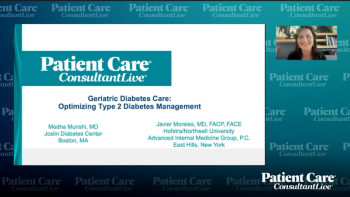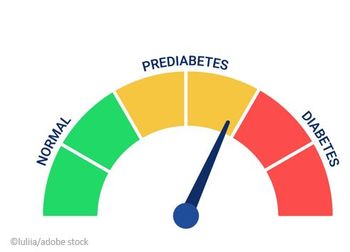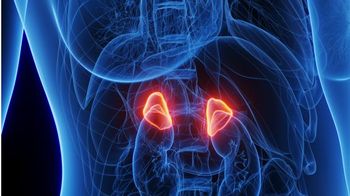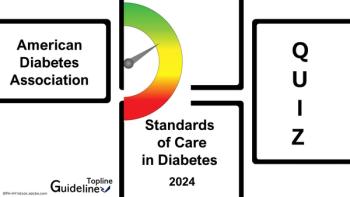
Results from secondary analysis suggest future work is needed to extend the prevention intervention to address additional chronic conditions and substance use.


Results from secondary analysis suggest future work is needed to extend the prevention intervention to address additional chronic conditions and substance use.

Your daily dose of the clinical news you may have missed.

The antigen-specific immunotherapy preserves endogenous insulin production via intralymphatic injection of recombinant GAD65 protein, according to Diamyd Medical.

The oral GLP-1 RA was associated with weight loss of 7.3% in just 4 weeks and is designed with unique properties that will enhance multiple outcomes, Roche said.

The expert panel concludes by analyzing a patient case and offering final insights on customizing treatment for complex geriatric diabetes patients, taking into account cardiovascular health, weight management, and renal function considerations.

Key opinion leaders explore methods for optimizing treatment in older adults with type 2 diabetes, focusing on streamlining regimens and the process of deprescribing, with particular emphasis on defining and implementing the deprescribing approach.

Experts examine strategies for managing treatment modifications in older adults with type 2 diabetes, weighing the approaches, challenges, and advantages of combination therapy regimens.

Leading experts in geriatric diabetes care explore comprehensive aspects of insulin therapy, including dosing strategies, available injectable options, and methods for tailoring glucose control in elderly patients.

The panelists analyze a patient case, examining treatment profiles, adherence factors, and drug class selection criteria while discussing strategies to enhance elderly care.

Key opinion leaders explore strategies for enhancing elderly patient care by implementing American Diabetes Association guidelines on glycemic targets and long-term management in geriatric settings.

Your daily dose of the clinical news you may have missed.

In the mouse model of type 1 diabetes, a combined harmine/exendin-4 therapy resulted in an up to 7-fold increase in β cell numbers over 3 months, reported investigators.

Long-term risk of death decreased by 26% and risk for vascular complications decreased by 40% in persons who remained diabetes-free for 4 years, according to new data.

The agency is concerned about manufacturing processes involved in production and about the proposed indication for adults with type 1 diabetes.

Your daily dose of the clinical news you may have missed.

Tirzepatide-treated participants were 3 times more likely than those treated with semaglutide to reach weight loss of 15% or greater, the head-to-head study found.

GLP-1RAs were associated with a significantly reduced risk of obesity-associated cancers including gallbladder cancer, pancreatic cancer, and meningioma.

The international statement targets primary care clinicians and endocrinologists with detailed guidance on monitoring disease progression and providing education.

The risk for developing CVD and T2D was highest among individuals who frequently experienced the behavior in the workplace, according to new study.

Key opinion leaders in the management of diabetes delineate the definition of older patients and examine the implications of homeostenosis, a condition that disrupts homeostatic mechanisms in aging individuals.

ADA 2024. Adults started on the Omnipod 5 AID system had an A1c reduction from 8.2% at baseline to 7.4% at 13 weeks, researchers report.

Medha Munshi, MD, and Javier Morales, MD, FACP, FACE, emphasize the significance of personalized diabetes management, emphasizing age and other patient-specific factors as crucial considerations for optimizing care.

ADA 2024. Adults using more antihypertensive medications had higher odds for hypercortisolism, according to new data from the CATALYST phase 4 study.

Your daily dose of the clinical news you may have missed.

This quick quiz tests what you know about updates to the 2024 ADA standards of care, which include guidance on antiobesity drugs and managing comorbid chronic disease.